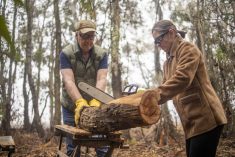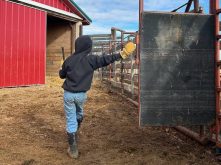In our introductory article to this series we looked back over our last 10 years identifying successes and messes we’ve seen in business transitions. We developed an extensive list of reasons why those transitions were successful or what caused them to go off the rails. We grouped this list into five key areas that captured our list. It was obvious to us that none of these areas operate independently within a successful business transition. We liken a successful business transition to an operating planetary gear. Our aim is to share the successful traits and habits in each of these components.
Read Also

Cereal lodging isn’t just a nitrogen problem
Lack of copper in the soil can also lead wheat and other cereal crops to lodge during wet seasons on the Canadian Prairies.
In this column, we want to examine the second gear for any signs of wear. This is the “family” gear.
Family
Family is a topic that many people avoid like exercise and dieting. It doesn’t seem fun or interesting, and it appears that someone is either going to end up crying, shouting or worst of all not saying anything and walking out the door.
Family is like that prize Purebred show bull, the potential is endless — he could change the genetic base of the farm forever. However, if that prize bull is not cared for, he could end up with foot rot or worse, rendering him useless.
Family relationships need to be nurtured and cared for; everyone needs to realize from the onset of succession planning that they will be stressed and strained at one point, but that as long as there are more positive experiences than negative ones the relationship will survive.
A positive family succession plan has clear business roles and clear family roles, neither overlapping. Messes occur when the culture of the kitchen table migrates into the business. This can occur in many ways. The most common is hurt feelings versus hurt businesses.
- From the Country Guide website: Take a detour?
Parents must be conscious of making a trade-off if they want all of their children to be part of the farm decision making process to keep the “family farm” culture. Generally one of two things happens. First, you have farming children with hurt feelings. They feel they’ve put time, effort, energy and money into the farm, only to have their opinions given equal weight to those of the non-farming children. Second, you can get a hurt business if non-farming children’s opinions are valued too highly and result in poor business decisions.
Professional business culture
A professional culture within the business ensures that the right people are basing their decisions on the right information at the right time. What does a professional culture look like? It looks like meetings, and lots of them. A professional culture does not look like Dad changing the oil, Mom working in the garden and the son or daughter yelling across the yard, “What are we going to seed next year?”
Formality is important for a farm family to be successful at this. Meetings need to be scheduled, with agendas made and people bringing information to the table for discussion. If this cannot be accomplished your chances for success in bringing in that next generation are drastically reduced; everyone should realize the risk of failure.
Your family does not necessarily have to agree on whether fungicides or antibiotics will be used on the farm. Your family should be able to agree on a process that will be used to make these types of decisions. A professional culture provides structure in which difficult conversations can take place and healthy criticism and coaching can occur while minimizing the risk to the family relationships.
Once a professional culture has been established it is often helpful to have job descriptions to provide clarification around how certain tasks need to be done on the farm. This sets boundaries, helping everyone maintain a clear distinction between family and business. It helps to set expectations around the time and commitment that will be required from all family members. A job that does not get done on the farm generally has negative financial consequences to the business. When expectations are not met, there are consequences to the family; these consequences can be far greater. Without clear job descriptions everyone is guessing about the other family members’ expectations.
Being proactive and keeping the family gear functioning well can pay big dividends in the future. Very few operations are willing to sacrifice family for succession at the onset of the process, however family issues can derail the process just as easily as any of the other planetary gears.














